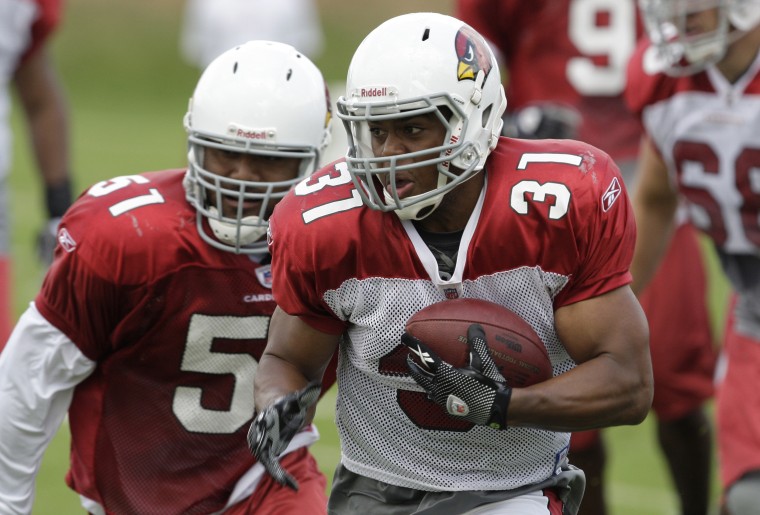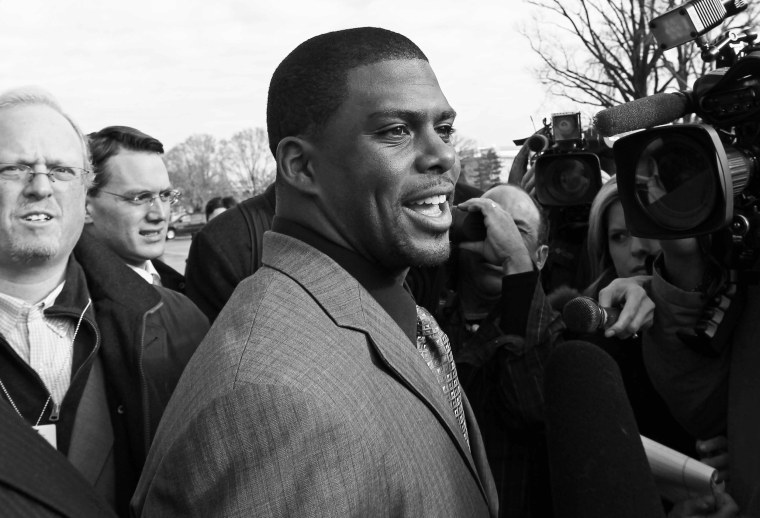Jason Wright has heard the comments, the whispers, the armchair quarterbacking.
He certainly has read enough about the negativity surrounding his new job in the high-profile world of the National Football League.
In any other time, Wright’s appointment as the new president of the Washington Football Team would have been met and celebrated with the usual flair in terms of being groundbreaking and shattering barriers.
But this is 2020, a year complete with heightened awareness over racial inequalities and debate at every turn. It was in this climate that he became the NFL’s first Black president of any franchise earlier this month. Considering that Washington’s team has stayed in the news for things other than any measure of football success, he knows that eyes will be trained on him and the team with even more scrutiny.
“This is not anything new,” Wright said about critics. “I experienced it in corporate America. So, I am not shocked. It does not affect my confidence or my approach for taking this role.
“If you took my picture off the résumé and just read through it, would it sound like a team president? I would argue it does,” he added. “If somehow, Blackness or fill-in-the-blank characteristics all of a sudden makes a résumé look less good than it would have otherwise, that’s all you need to know about that individual’s worldview.”
Wright, 38, is also the youngest team president in the league. He spent seven years in the NFL, playing for the San Francisco 49ers, Atlanta Falcons, Cleveland Browns and Arizona Cardinals. After hanging up his cleats, he earned his MBA at the University of Chicago and was named partner at McKinsey & Company, a New York City based management consulting firm. He said he didn’t have plans to get back into sports, but the opportunity arose.

Wright begins his new job later this month, reporting directly to majority owner Daniel Snyder. He’ll be tasked with heading up the business side of the franchise to include marketing and sales.
Snyder’s two-decade reign over one of the league’s oldest franchises has been criticized often, mostly for his handling of the controversial team name and other blunders.
"We will not rest until we are a championship caliber team, on and off the field,” he said in a statement. “Jason has a proven track record in helping businesses transform culturally, operationally and financially. He is a proactive and assertive advocate for inclusion of all people and will set new standards for our organization, and for the league.”
Wright takes over for Bruce Allen, whose 10-year run ended in December. Under Allen’s watch, Washington made just two playoff appearances and only four teams had a worse winning percentage in that span.
Washington also hasn’t had a single playoff victory in 15 years.
“Because he knows the NFL firsthand and how fast it moves, I am excited to have him on board to head up the front office and operations, so that I can focus on what's most important to the fans in our community – winning football games,” head coach Ron Rivera said.
Wright maintains that the team will establish a new culture “between the lines” and that the team will strive to be inclusive, transparent and accountable.
The accountability started last month when Snyder announced that the team would “be retiring the Redskins name and logo” while keeping the burgundy and gold color scheme. The change comes after years of lobbying from organizations against the use of Native American stereotypes in team logos, more recent work from the Black Lives Matter movement, and pressure from corporate sponsors including FedEx, which has the naming rights to Washington’s 82,000-seat stadium in Landover, Maryland.
A week before the announced name change, The Washington Post reported that at least a dozen women employees alleged they were sexually harassed and verbally abused over a decade, leading to three staffers being fired.
The team hired the law firm Wilkinson Walsh to investigate the allegations, promising to seek “an independent review of the team’s culture, policies and allegations of workplace misconduct.”
The NFL may also have its say in the matter depending on what the review ultimately finds.
But Wright said he is getting an opportunity to turn around the negative perceptions around the team. The top priorities will be making sure the business side is secure, keeping the passionate fans engaged and to warm up relationships that have “gone cold.” Wright also will dig deep into possibly relocating from FedEx Field, with some D.C. officials saying nothing is happening on the new stadium front until the nickname is changed.
For being the first Black American in this type of executive role, Wright doesn’t necessarily think the Rooney Rule, a league mandate that teams interview minority candidates for head coaching and football operation positions, played a factor.
“I wouldn’t throw the baby out with the bathwater,” Wright said. “Many corporations would bristle at the Rooney Rule itself. It’s been around so long in the league that we’re a bit blasé about it. It’s not insignificant. Does everyone want to do more? Of course. That should be a source of fuel for creative problem solving. But you’re hard-pressed to say it’s a bad thing.”
Wright said the first thing young people of color who want to ascend to his heights should do is to become a student of whatever interests them.
“Genuinely understand what you are interested in, where you don’t mind putting in the hard work to be excellent at anything,” he said. “It doesn’t matter what type of job it is, you’re trying to get paid. That is not a bad motivation. That just means apply yourself to the discipline of trying to generate wealth for yourself and others.”
Will Wright’s appointment change the landscape of executives with an influx of minority hiring? That remains to be seen, as his success or failure in the job could go a long way to answering that question. But he does have sage advice for people of color looking to climb the NFL’s corporate ladder: “You belong,” he said. “You’re not the exception to the rule, you’re not the product of a lower bar, you are not the output of a program. You belong.”
